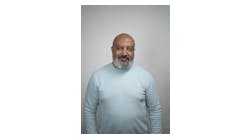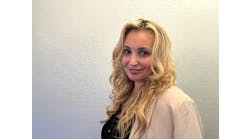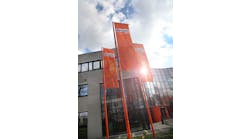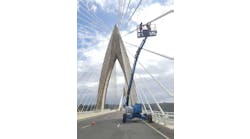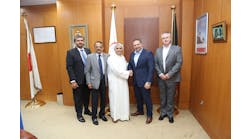When I first walked into Riwal's headquarters in Dordrecht, Netherlands, I was told CEO Dick Schalekamp was in a meeting. I'll be glad to wait, I said. As we walked by the meeting room, Schalekamp, dressed casually in jeans, t-shirt, casual sport coat and boots, whirled around, stood up and walked towards me with his hand extended.
“Hi,” he said. “My name is Dick.”
Schalekamp's casual friendliness, I soon found out, was one of the keys to what makes Riwal, a €130 million (U.S. $193 million) company, tick.
If you look at a map, you might wonder what kind of plan a company has with headquarters in the Netherlands, and operations in France, Denmark, Norway, Poland, Slovenia, Croatia, Lithuania, Estonia, Latvia, Spain, Kazakhstan, Dubai and Brazil, with rental customers and business activities in the Middle East, Germany and others. It has plans on the drawing board to expand into Russia. But Riwal, the aerial rental company that is the largest JLG dealer in the world outside the United States, tends to defy expectations and doesn't do things the conventional way. And its insistence in following its own vision is probably the source of its strength and the reason it is one of the fastest-growing rental companies in the world.
Riwal's recipe for expansion is not based on strategies developed sitting in a boardroom and saying, “We have to be in this country and that country next.” For Riwal, a family-owned company celebrating 40 years in business, it's all about people.
“It's only about people,” says the personable and charismatic Schalekamp. “Machines you can buy everywhere, but our growth depends on people. We weren't looking to start in Brazil, we didn't say ‘We must be in Kazakhstan,’ we weren't looking to start in Spain or France. It just developed from the people we had. That's who makes the business. Someone works with us and wants to start a company in his country and get an ownership share — about 15 percent — they can do it. Otherwise it doesn't work.”
Rik Maaskant, vice president of marketing and communications, explains further. “Europe is totally different from the United States,” he says. “We have a lot of countries, and they are totally different. If you go across the border to start a new company, you have to have people from that country. That's our philosophy. We don't think, for example, ‘We want to be in Belgium.’ But if we happen to find a person from Belgium who would like to work for us in a way that is the Riwal way, and that guy has our confidence, and he has the enthusiasm to start his own company, we grant him a small stake in the company and that country becomes the next Riwal country. So if you look at the Riwal map, you see white spots and green spots. We are in Kazakhstan, but in between Kazakhstan and The Netherlands, we don't have branches in Germany, for example, and we aren't in the Czech Republic or Turkey.”
The pioneer of Riwal's business in Brazil is married to a Brazilian. He had connections and roots in the country and was willing to develop Riwal there. The leader of the Kazakhstan branch was married to a woman from there, lived there for years, speaks Russian and Kazakh and has the entrepreneurial spirit. The founder of Riwal's operations in France formerly worked for an aerial manufacturer who had worked in France and had good relationships with Riwal.
And, as Schalekamp says, they were willing to work according to the Riwal mentality. What makes a person fit in with the Riwal group?
“People who are flexible,” Schalekamp says. “Adaptive. Informal. Open-minded. It's all about trust. People have to have knowledge of the market and fit in with our team. When we look at an operational team or technical team or administrative team, there is a Riwal atmosphere. We have many different people working for us, so we can't say exactly what is the Riwal mentality, but we know it's a family-like idea. We have outings together, we do things for each other. It's very friendly throughout the company. We try not to be formal.”
While, as Schalenkamp says, there is the same feeling in Riwal branches no matter where they are, with little formal hierarchy, it can't be said that operations are entirely uniform. “Everybody has his job, everybody knows what his goal is,” says Maaskant. “We leave people to do things in their own way, in their own time, more or less, and that gives people some freedom. Everybody is independent, set to his individual standards. The two guys here in the rental department are doing their jobs right, but not exactly in the same way. Then people feel good about doing their jobs in the right way and the people feel appreciated. We set goals, but people have freedom in how they do their jobs.”
Was international expansion a necessity? Obviously when a country is about 100 miles wide and about 200 miles tall and you can cross the country in a couple of hours, the market has limits. Riwal had about 1,000 aerial units when it set up its first branch outside Holland (Denmark in 2001), and now has about 10,000 units. But growth was never the goal for its own sake.
“It's not a must to grow,” Schalekamp says. “We don't have shareholders telling us we have to grow to a certain size. It's just the opportunity to make business. We have board meetings but nobody ever says, ‘We have to go there and there.’ We see what we do and we see how we can do it the best way.”
Schalekamp smiles his big friendly smile. “I like to travel and meet all kinds of people and that's why we expand.”
Of course it's not that simple, but a look back at Riwal's history helps one understand the dramatic growth that has propelled Riwal to become one of the international giants of aerial rental.
from cranes to awps
In 1968 Richards & Wallington was founded as the Dutch subsidiary of what was then the largest crane rental company in the world. Schalekamp's father, Dick Sr., took over the company in 1980, buying the Dutch operation out of a Chapter 11-type situation of Richards & Wallington in the U.K. In 1987, the Schalekamp family expanded its inventory to include aerial work platforms, and in 1989 Dick Sr. retired to let his sons run the business including Dick Jr., who joined the company in 1986. In 1998, the Riwal name — a combination of the names Richards & Wallington — was launched.
Originally, the company was a crane rental specialist, developing the aerial work platform business in the late 1980s after Dick Jr. became involved in the business. “I was never into the crane business,” Schalekamp says. “I was always into aerials.” When Dick Schalekamp Jr. got into the family business, his older brother Jaap was leading the cranes division with his father. Dick Jr. took on the challenge of making the aerial division a self-sustaining division within Riwal.
Over the past decade or so, the Riwal balance between cranes and aerial work platforms tilted heavily towards the latter, in volume as well as profitability. When the company began its international growth in 2001, it made a strategic decision to expand only in unmanned equipment, making it easier to move equipment from one company to another.
Although that strategic decision was made, the company held on to its crane inventory until recently for what Maaskant calls “emotional reasons.”
“The family started with cranes, and most crane employees have been with us for more than 15 years and some more than 30 years,” he says. “Early last year, Sarens approached us to discuss the transfer of cranes, personnel and customers.” It was a positive deal for Riwal's crane staff because Sarens' Netherlands headquarters is located two miles from Riwal.
“Also they [Sarens] are crane specialists who will provide better career opportunities for our crane staff,” says Maaskant. “People will get more appreciation for their hard work whereas at Riwal it sometimes stayed unnoticed because of all the successes with the AWP business.”
Dick's brother Jaap Schalekamp still owns one-third of Riwal, but stepped aside from daily management activity after the crane division was sold. He will continue to be involved with the company in some projects, such as the development of the new headquarters.
The company's Dordrecht location is strategic, positioned just south of Rotterdam, the world's largest port, and is not far from the port of Antwerp, Belgium, also a major port. Since Riwal sells new and used equipment, and rents and re-rents to customers in many countries, proximity to the ports is an important advantage.
In March, 2001, Riwal established its first branch outside the borders of Holland, opening in Odense, Denmark. Riwal now has more than 600 units in Denmark, with additional branches in Danish cities Roskilde and Randers. In August 2005, Riwal opened an operation in Ljubljana, Slovenia. In February 2006, Riwal opened a rental operation in Chartres, France, and within a year began branches in Nantes and Bordeaux, and has since opened two more locations. In 2007, Riwal opened in Atyrau, Kazakhstan, renting generators as well as aerial equipment. In 2007, Riwal sold its crane inventory, allowing it to specialize in aerial work platforms and telehandlers.
While expansion has always occurred because of people and relationships in the past, or acquiring a smaller firm such as a truck-mounted aerial specialist company in the Netherlands, a subsidiary of a competitor in Denmark and a similar deal in France, in recent months Riwal began to expand through acquisitions of larger companies, acquiring Grupo Clem and its aerial inventory in Spain (about 1,700 units) allowing Riwal to further its activities in a country where it already had a fair number of customers. It was the first time Riwal expanded by buying into a new country as opposed to greenfield operations. Riwal acquired 123 Lift in Estonia recently as well.
“This is not, however, a shift in our strategy,” says Maaskant. “If we meet the right managing partner for a potential new Riwal operation, we do not mind if he has got a running business as long as he has the right set of local market knowledge, skills, contacts and, foremost, trustworthiness and attitude to join Team Riwal.”
Riwal has about 2,000 aerial units in its Netherlands fleet, making it more than twice the size of its nearest competitor within the country. Internationally the company has more than 10,000 aerial units, and also carries telehandlers, as well as large generators in Kazakhstan and Dubai. Riwal expects to expand to about 20,000 machines over the next three to five years.
In addition to international expansion, Riwal is investing in its own infrastructure. It recently developed its own software system, adapting a system developed by Microsoft Dynamics and over three years modifying it to fit its needs. While Riwal is not yet heavily involved in e-commerce, it is working on developing e-commerce modules and encourages customers to e-mail reservations for machines for jobs if the lead time is 48 hours or more.
Riwal has long outgrown its current headquarters so it has acquired several properties to help maintain the company's needs, requiring a lot of space to receive new machines and perform inspections on them. The current headquarters is a 30,000-square-meter facility. Riwal recently bought a 50,000-square-foot facility to move into in 2010. Riwal has so many machines and has so outgrown its current facility that many units are parked on surrounding streets.
Riwal, like many larger rental companies, has a department for selling used machines, an area that might become particularly strong for Riwal in the coming years. “The long-run forecast for the whole industry is going to keep growing all over the world,” says Maaskant. “Asia, South America, Africa are all emerging markets. Russia is a fast-growing market. I don't think manufacturers can raise production quickly enough to meet demand, so there will be a lot of demand for second-hand machines. You just have to be flexible and mobile and go where the market is going.”
Just like in the United States, in what appears to be a universal problem, Riwal faces a constant challenge to hire enough service mechanics to support its fleet. The company employs 30 service technicians at its headquarters and has another nine on the road in service trucks.
Riwal also does a significant re-rental business called Ri-Rent Europe, often renting machines on multi-year leases to rental companies that can't finance the machines on their own. The company is a 50-50 joint venture with JLG providing re-rental and financial solutions to JLG customers, with local support provided by JLG.
European customers are becoming more aware of safety concerns and in recent years many of Riwal's industrial customers have awarded jobs based on the company's safety record.
Riwal also faces the issue, similar to large U.S. rental companies that rent to large industrial facilities, of coordinating its rentals to those large facilities. For example, one large industrial customer has 70 different people that, at different times, order machines. “There is one guy that orders 400 machines a year, so he puts in 400 orders per year,” Maaskant says. “Because they have so many business units inside this factory and they've got three shifts, and there's a couple of different people on each shift that might order machines. So on the same job, we might have 10 different people call in the same day ordering machines that will go to the same place.”
Doing business internationally also requires multiple language skills. Many Dutch people speak three or four languages or more, and for Riwal sales staff, language capability is a requirement and multi-lingual capability is normal among Riwal personnel.
While rental mentality dominates at Riwal, the company is a JLG dealer in Holland and many other countries and is the world's largest JLG dealer outside the United States. Riwal also represents Holland Lift and Teupen aerials in most of Scandinavia. In Kazakhstan, Riwal sells most Bobcat equipment as well as Ingersoll Rand generators and air compressors.
Riwal expects to continue its solid 20-percent-plus annual growth and to Dick Shalekamp Jr., growth could come in many different directions. He even doesn't rule out the possibility of doing business in North America in the future. However, there is no blueprint or plan. There is only people and the Riwal way.
